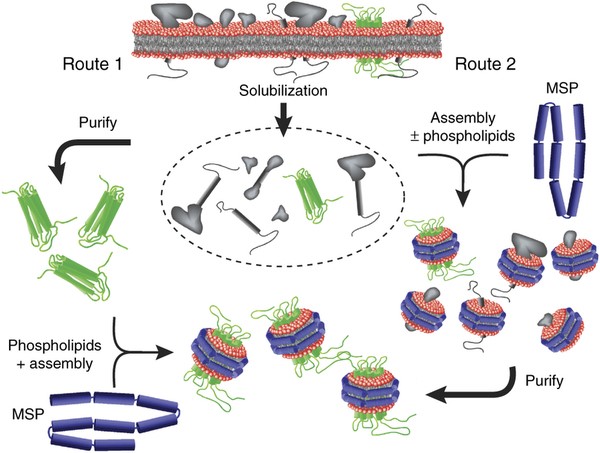Mempro™ Nanodisc Synthesis Services
Creative Biostructure has established an advanced Mempro™ Nanodisc preparation platform for a long time. With our sophisticated scientists hammered at Nanodisc technology for years, we can provide tailored Mempro™ Nanodisc synthesis services to meet all your requirements.
Nanodiscs are soluble nanoscale phospholipid bilayers, which are encircled and stabilized by membrane scaffold proteins (MSP), and they have been proved to be a powerful and promising tool to study membrane proteins. A bilayer domain is formed by the combined phospholipid, meanwhile, the edges of the discoidal structure are warped around by two molecules of MSP in a belt-like configuration, one MSP covering the hydrophobic alkyl chains of each leaflet. In contrast with bicelles, detergent micelles and liposomes, a more native environment where proteins remain monodisperse and active can be offered by Nanodiscs.
 Figure: Cell-free synthesis of membrane proteins in presence of different lipid based membrane structures.
Figure: Cell-free synthesis of membrane proteins in presence of different lipid based membrane structures.
Nanodiscs are assembled by a compound of detergent/phospholipid micelles and MSP by removing the detergent. In this process the molar stoichiometry of phospholipid (PL) is crucial and decided by the length of the MSP belt. In order to get homogeneous size of Nanodiscs, Creative Biostructure uses the exact PL/MSP ratio empirically, just in this case, it can self-assembly with a homogeneous size and form with little else in solution. If the ratio is slightly off, the redundant PL or scaffold protein will present as an aggregate in the void volume of a size exclusion column. If the ratio is seriously inappropriate, nevertheless, diverse lipoprotein particles are formed, of course some Nanodiscs, but a great number of aggregates of varying size.
In most instances, the membrane protein is absolutely pre-solubilized with a compatible detergent and mingled with the Nanodisc assembly ingredient. It is broadly realized that removal of a protein from the membrane can be most difficult: although the protein seems to be solubilized, it probably still become congregate or undergo time-dependent aggregation. As detergent solubilization achieved, the protein highly possible self-assemble with PL and MSP into Nanodiscs when the detergent is removed. After removing the detergent, the related recognition events including target protein–lipid and lipid–lipid contacts as the Nanodisc bilayer generated, with the target protein eventually combined into the bilayer in its native-like configuration.
Creative Biostructure provides other various Mempro™ Nanodisc preparation services. Please feel free to contact us for a detailed quote.
References:
Inagaki S, Ghirlando R, Grisshammer R. Biophysical characterization of membrane proteins in nanodiscs[J]. Methods, 2013, 59(3): 287-300.
Denisov I G, Grinkova Y V, Lazarides A A, et al. Directed self-assembly of monodisperse phospholipid bilayer Nanodiscs with controlled size[J]. Journal of the American Chemical Society, 2004, 126(11): 3477-3487.
Zou G, Xiong K, Jiang C, et al. Magnetic Fe3O4 nanodisc synthesis on a large scale via a surfactant-assisted process[J]. Nanotechnology, 2005, 16(9): 1584.
Choi J, Kang N, Yang H Y, et al. Colloidal synthesis of cubic-phase copper selenide nanodiscs and their optoelectronic properties[J]. Chemistry of Materials, 2010, 22(12): 3586-3588.